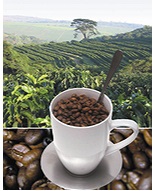May 2014
[Submitted by Tillie MacDonald, General Manager, Centre For Business and Economic Development, Collingwood]
In 2007, David Wilding-Davies moved his business, Ashanti Coffee, 13,000 miles west from Zimbabwe in Africa to Thornbury, near Collingwood. He was glad to be coming home and he was bringing part of Zimbabwe with him.
An Olympic equestrian who made his living in that business, David had a dream to own a farm in Africa. His first contact with the region was on a tour of Africa in the early 1990’s.
“Zimbabwe is a beautiful area”, says David. “Especially high in the mountains. And it has a temperate, healthy climate”. He moved to Zimbabwe in 1998, determined to find the farming operation he sought.
In 2000, he found and bought the farm that produces his Ashanti coffee beans. “The farm needed to be completely re-planted before it could produce properly. We knew it would take 3 years to be established”, adds David.
In 2003, Ashanti Coffee received the Coffee Grower of the Year Award. David would not have long to savour that initial success. In 2005, civil unrest in Zimbabwe saw him expelled from his land, and lose over 50% of that land illegally.
That setback led him to bring the business to Canada to a shop in Thornbury. David bought a 12 kilogram coffee roaster and started his new venture, Ashanti Coffee Enterprises using the tagline, “From Farm to Cup”.
David said, “We are fortunate that Ashanti is such a great tasting coffee. We knew we could roast it and sell it as a finished product”.
In 2007, the next step was to open a café in the front of the building where the coffee was roasted. Customers would come in to see the roasting process and purchase pounds of coffee or just enjoy a cup.
The café storefront quickly eclipsed the tourist attraction of seeing the coffee roasted. David offered, “I had to move the roaster out of the original building to one around the corner”.
Two farmer friends in Zimbabwe still farm Ashanti beans on David’s land and some on theirs to provide enough Ashanti beans to satisfy the company’s needs. Beans are picked from April to October, but the bulk of the harvesting (60%) is done in August and September. In November, the coffee is milled, graded and prepared for shipping.
Shipments arrive in February and March. The green coffee is very hardy and keeps well. David now roasts finished product as needed. He now has a 30 kg roaster and roasts 90 kgs. an hour, usually 3 times a week.
David travels back to Zimbabwe annually to visit the farm and renew friendships. He does not go back empty-handed. When the local school burned down, staff and students asked to work as pickers to raise money to rebuild. He hired all who could work and matched the funds they earned with his own contribution. When they were ready, he sent his farm manager to oversee the re-building.
On his annual trips he brings school supplies, blackboards and money to keep the school going. David has sponsored several Canadian events to raise funds for the people in Zimbabwe.
Ashanti Coffee Enterprises has grown to a second café in Collingwood at 510 First St. and a third in the summit chalet at the Alpine Ski Club in The Blue Mountains, Ontario.
David’s future expansion plans for Ashanti Coffee centre on a franchise model he is currently developing. For now, he is content to continue farming the beans in Zimbabwe and sell the coffee he traveled so far to bring home to Canada.
Ashanti Coffee Enterprises is a client of the Centre For Business and Economic Development, Collingwood, Ontario, a member of the Western Ontario Community Futures Development Corporation Association (WOCFDCA). Community Futures Development Corporations are non profit organizations staffed by professionals and governed by a local volunteer board of directors. For more information on the CFDC in your area, visit www.wocfdca.com





